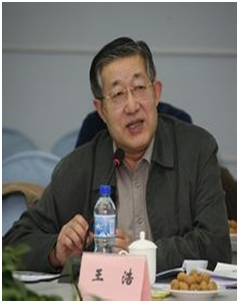 Academician Wang Hao was born in Beijing on August 1953. He is currently a distinguished expert on hydrology and water resources as well as a senior engineer and PhD advisor at the China Water Conservancy Hydropower Science Academy. He received his Academician title from the Chinese Academy of Engineering in November 2005.
Academician Wang Hao was born in Beijing on August 1953. He is currently a distinguished expert on hydrology and water resources as well as a senior engineer and PhD advisor at the China Water Conservancy Hydropower Science Academy. He received his Academician title from the Chinese Academy of Engineering in November 2005.
Currently, he serves as
The director of the State Key Laboratory of Simulation and Regulation of Water Cycle in River Basin;
The honorary director of the Institute of Water Resources of the Chinese Academy of Water Sciences;
Vice president of the Global Water Partnership (China), Deputy Chair of the China Water Strategy Research Association;
as well as the Deputy Chair of a number of national academic groups including the Chinese Society of Resources, the China Society for Sustainable Development, and the Innovative Methods Society.
Professor Wang is also serving on the technology board of member governmental organizations, including the Ministry of Water Resources, the Ministry of Environmental Protection, and the State Forestry Administration. He is also the recipient of distinguished fellowship from the State Council. He joined Jilin University on 2016 under the Academician joint-faculty program.
Throughout his career, Professor Wang has distinguished himself through multiple awards. Has won one United Nations Global Habitat Environment Award; One first prize and six second prize from the National Scientific and Technological Progress Award; One provincial and ministerial distinguished award, 16 first-class awards, and more than 30 other scientific and technological awards. Additionally, he is also holds the honorary titles of "Exemplary Chinese Laborer", "National Outstanding Academic Researcher", "National Outstanding Professional and Technical Talent". Professor Wang has authored than 30 books, published more than 300 academic articles, and won one Chinese Book Award.
Professor Wang has overseen the completion of nearly 100 major projects (scientific research, planning, proof of concepts and consultations) that totals billions of yuan in funding. In recent years, he has served as chief scientist on two National 973 Program Projects (66 million yuan), one National Major Water Program (20.2683 million yuan), and presided over three supporting key scientific and technology projects for the National Eleventh Five-Year Plan and the Twelfth Five-Year Plan. He has also led one National Natural Science Innovation Group Grant project. Additionally he has presided over dozens of key research and planning, consulting projects and international cooperation projects at the ministerial level, the Chinese Academy of Engineering level, and provincial levels.
Professor Wang's theory on "natural-artificial" binary water cycle was highly impactful, under the foundation of which, he established simulations and multi-dimensional regulatory systems for water circulation and associated water ecology, water chemistry and water sediment process. He also established the "Climate-Hydrology-Ecology" Coupling Simulation, Forecasting Model of Water Resources and Water Demand under Changing Environments, Remote Sensing and Air-Land Coupling Forecast for Soil Moisture, and the Real-Time Water Resources Scheduling System.
Professor Wang has paid great attention to the integration of academic research with major national strategic needs, and the above-mentioned models and systems have been implemented at the national, watershed and regional levels, as well as being adopted by Chinese authorities in water conservancy, environmental protection, forestry, land. His research was instrumental in national strategies such as the Large-Scale Development of Western China, The Revitalization of the Old Industrial Bases in Northeast China, The Coordinated Development of Beijing-Tianjin-Hebei, The Yangtze River Economic Belt, the South-to-North Water Transfer Project, and the Three Gorges Dam Project. Through these projects, he has promoted the sustainable use of water resources, water security and ecological civilization construction, and achieved remarkable social economy and ecological environment benefits. Finally, Professor Wang is a staunch advocate for the development of China's hydrological and water resources academic discipline; he has also been recognized multiple times for his leadership in research organization, and in teaching.